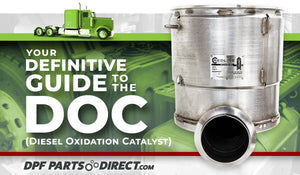We’ve probably all seen this. Billowing black smoke pours from a diesel pickup or
semi as it pulls away from a stop light. As the smoke slowly clears, it’s obvious
something isn’t working right. The other possibility is that someone, usually a "redneck", does this intentionally - it’s called “rolling coal”. Depending on your sense of humor or political leanings, this is either annoyingly anti-social or hilariously mischievous behavior, but this isn’t what we’re talking about.
If your truck is spitting out this thick, smelly smoke screen it indicates a big
problem with the vehicle’s engine. Promptly addressing this issue is important to
prevent further damage to the vehicle. In this article we’ll cover how to be a
good neighbor and not smog out your fellow travelers.
In addition to some social stigma, ignoring the problem can lead to decreased
engine performance, reduced fuel efficiency, dirty looks, extra repair expenses,
and maybe getting pulled over by the “eco police” (is that a thing yet?). Unless
you’re intentionally rolling coal, you’ll need to find the root cause of the black
smoke ASAP, so you can get back to running clean, clear, and worry-free.
This tell-tale black smoke cloud from a diesel engine is not only problematic it is symptomatic. Some of the most common causes include a faulty fuel injector, a clogged air filter, or other malfunctioning engine components.
Incorrect Fuel-to-Air Ratio:
This can be caused by:
- Faulty Fuel Injectors: Worn or clogged fuel injectors can over-fuel the combustion chamber, resulting in black smoke.
- Dirty Air Filter: A clogged air filter restricts airflow, leading to a rich fuel-air mixture and incomplete combustion.
- Faulty Mass Airflow (MAF) Sensor: This sensor measures the amount of air entering the engine. A malfunctioning MAF sensor can cause inaccurate readings, leading to a rich fuel-air mixture.
- CAC Issues: The Charge Air Cooler (hoses or cooler itself) can contribute tons of smoke into the DPF - if there are cracks in the cooler or defective CAC hoses/clamps.
Engine Problems:
- Carbon Buildup: Excessive carbon deposits in the combustion chamber can hinder the combustion process, leading to incomplete burning of fuel.
- Clogged EGR Valve: A clogged Exhaust Gas Recirculation (EGR) valve can disrupt the engine's air-fuel mixture, causing black smoke.
Other Factors:
- Low-Quality Fuel: Using low-quality fuel can contribute to incomplete combustion and black smoke.
- Engine Malfunction: Other engine problems, such as a faulty turbocharger or a timing issue, can also cause black smoke.
Understanding Black Smoke from Diesel Exhaust
Black smoke emanating from a diesel engine's exhaust is an indication of incomplete combustion. When diesel fuel doesn't burn completely, it produces a dark, sooty byproduct. This incomplete combustion can be caused by various factors, including excessive fuel injection, a clogged air filter, or a malfunctioning fuel injector. In contrast to the normal, nearly transparent exhaust of a well-tuned diesel engine, black smoke is a sign of deeper issues that should be taken seriously.
While some degree of smoke is expected during cold starts or heavy acceleration, persistent black smoke under normal driving conditions warrants immediate attention. In the next section, we will go into more detail on the common reasons for this black smoke.

Common Causes of Black Smoke
Faulty Fuel Injectors
When your diesel engine starts belching out thick, black smoke, it's like a car's version of a coughing fit. This usually means something's gone wrong with the fuel injection system. Imagine tiny sprayers (fuel injectors) that aren't spraying fuel correctly. When they're not working right, too much fuel can get into the engine's cylinders. This extra fuel doesn't burn completely, and instead of turning into energy, it turns into black smoke.
To fix this smoky problem, you might need to clean or replace these faulty injectors. Think of it like unclogging a spray nozzle or replacing a leaky faucet. A good mechanic can diagnose the issue and get your diesel engine back to running clean and efficiently.
Clogged Air Filters
A dirty air filter can really mess up your diesel engine's performance. Think of it like trying to breathe through a clogged nose - it's tough! The air filter's job is to keep dirt and grime out of the engine, for the proper mix of air and fuel. When it gets clogged, not enough air can get in, which leads to a rich fuel mixture. This imbalance causes incomplete combustion, and that's what creates the pesky black smoke.
To fix this, you'll need to clean or replace the air filter. It's a simple fix, but it can make a big difference. A clean air filter will help your engine run smoother, use less fuel, and reduce those harmful emissions.
Turbocharger Issues
A malfunctioning turbocharger can significantly impact a diesel engine's performance and lead to excessive black smoke. This vital component utilizes exhaust gases to compress and force more air into the combustion chamber, boosting power and efficiency. However, when a turbocharger becomes damaged or worn, it may fail to operate optimally, leading to insufficient air supply and incomplete combustion. Common signs of a failing turbocharger include a noticeable loss of engine power, decreased fuel efficiency, and the emission of black smoke.
Other issues, such as a faulty wastegate or a clogged oil supply line, can also contribute to turbocharger problems and black smoke. To address these issues, a thorough inspection and potential repair or replacement of the turbocharger is necessary.
Faulty EGR Valve
An Exhaust Gas Recirculation (EGR) valve is a component designed to reduce nitrogen oxide emissions by recirculating a portion of the exhaust gas back into the combustion chamber. This process lowers combustion temperatures, thereby reducing the formation of harmful NOx. However, a faulty EGR valve can disrupt this process, leading to increased emissions and potential engine performance issues. When an EGR valve malfunctions, it may fail to regulate the flow of exhaust gas, resulting in an excess of unburned fuel in the combustion chamber.
This incomplete combustion can manifest as black smoke, reduced engine power, and poor fuel economy.
Cleaning or replacing the EGR valve is often necessary to address these problems. Regular maintenance and cleaning can help prevent issues and ensure optimal engine performance.
Over-fueling
Over-fueling, a condition where excess fuel is injected into the combustion chamber, is a common cause of black smoke in diesel engines. This can occur due to various reasons, including faulty fuel injectors, a malfunctioning fuel pump, or incorrect calibration of the engine's electronic control unit (ECU). When the engine receives more fuel than it can efficiently burn, the excess fuel is expelled as black smoke. This not only reduces engine performance and fuel economy but also contributes to increased emissions of harmful pollutants.
To address over-fueling, it is essential to diagnose the underlying cause and take appropriate corrective measures. This may involve cleaning or replacing faulty fuel injectors, repairing or replacing the fuel pump, or recalibrating the ECU to optimize fuel delivery. By addressing over-fueling, you can improve your diesel engine's performance, reduce emissions, and save money on fuel.

Diagnostic Tips
To pinpoint the cause of black smoke, a thorough inspection is crucial. Start with a visual check of the engine compartment, looking for signs of leaks, damaged hoses, or loose connections. Using a diagnostic tool, such as an OBD-II scanner, can provide valuable insights into engine performance and identify any error codes related to fuel injection, air intake, or emissions systems.
Additionally, regular maintenance checks, including oil changes, filter replacements, and injector cleaning, can help prevent issues that may lead to black smoke. By combining these diagnostic techniques and preventive maintenance, you can effectively identify and address the root cause of black smoke, restoring your diesel engine's optimal performance.
Preventative Measures
Regular maintenance is the key to preventing problems with black smoke and ensuring peak engine performance.
- Good prevention begins with timely oil changes, filter replacements, and injector cleaning.
- Maintaining a clean air filter is crucial for optimal airflow, preventing a rich fuel mixture that leads to black smoke.
- Additionally, regular inspection and cleaning of the turbocharger can help maintain its efficiency and prevent power loss and smoke issues.
Furthermore, using high-quality diesel fuel can significantly reduce the risk of black smoke. Premium diesel fuels often contain additives that can help clean the engine and improve fuel efficiency. These additives can help to prevent carbon buildup on fuel injectors and other engine components.
By following these preventive measures, you can significantly reduce the likelihood of black smoke and keep your diesel engine running smoothly.

When to Seek Professional Help
Even after performing basic maintenance checks, if you continue to have persistent black smoke from your diesel truck, it's time to seek professional help. Some indicators that professional assistance is needed include a significant drop in engine power, poor fuel economy, rough idling, or unusual noises.
Consulting a diesel engine technician can provide accurate diagnosis and effective solutions. These experts have the knowledge and tools to identify the root cause of the problem.
During a professional diagnostic process, the mechanic will conduct a thorough inspection of the engine, including checking for any visible damage, leaks, or loose connections. They may also use advanced diagnostic tools to analyze engine performance data, such as fuel pressure, airflow, and exhaust gas temperature.
Once the issue is identified, the mechanic will recommend the appropriate repair, which may involve cleaning or replacing faulty components or performing a more extensive engine overhaul. By seeking professional help, you can ensure that your diesel truck is repaired correctly and efficiently, minimizing downtime and preventing future issues.
(Conclusion): Keep Your Diesel Running Smooth
Now that we've cleared the air about black smoke. The key takeaway is that black smoke isn't just stinky; it's a sign that something's not right under the hood. Whether it's a dirty air filter, a faulty fuel injector, or a tired turbocharger, these issues can lead to decreased performance, poor fuel economy, and increased emissions.
To keep your diesel truck running smoothly and efficiently, regular maintenance is important. Think of it like a periodic health check-up for your vehicle. Oil changes, filter replacements, and injector cleanings can help prevent many of the issues that cause black smoke. And if you do notice any signs of trouble, don't wait to seek professional help. A qualified mechanic can diagnose the problem and get your truck back on the road.
By taking proactive steps to maintain your diesel engine and address issues promptly, you can enjoy many miles of reliable and efficient performance. It’s just good old-fashioned common sense.










Comments 0